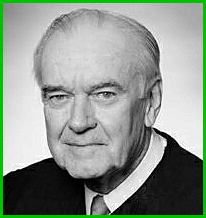

Thomas Aquinas Flannery was born at 707 Second Street NW, Swampoodle, Washington D.C. on 10th May 1918; the son of John J. and Mary (née Sullivan) Flannery. His father was a carpenter from Delaware. His grandfather had emigrated from Ireland.
He graduated from Gonzaga College Washington High School, and without going to college studied law at night. He graduated from Columbus University Law School (now part of Catholic University) in 1940.
He served as a combat intelligence officer in the Army Air Forces in Europe during World War II.
After the war, he was in private practice before working for the Department of Justice. He tried more than 300 cases before juries as an assistant U.S. attorney from 1950 to 1962. After seven subsequent years with the Washington law firm of Hamilton and Hamilton, he was appointed to the U.S. attorney's post by President Richard M. Nixon in 1969 and named a federal judge in 1971. Just after he was nominated to the federal bench, he described his views on the law as "conservative by modern-day standards". On the bench, the tall, soft-spoken man was regarded as a moderate and was considered fair-minded by prosecutors and defence lawyers at the time he took semi-retired senior status. He left the bench in 2001.
Thomas served on special assignment in 1983 and 1984 as the judge in the trial of nine Nazis and Ku Klux Klan members charged with civil rights violations after a 1979 anti-Klan rally in Greensboro, N.C., turned violent. He adjudicated the Exxon oil-price scam case in the 1980s, which the prosecution won, and ordered the company to repay $1.5 billion in overcharges. He also oversaw the conviction of former D.C. Superior Court Judge Robert H. Campbell for accepting an illegal gift from a Bladensburg construction firm while on the bench.
In 2000, Thomas was received the American Inns of Court Professionalism Award for the D.C. Circuit. This prestigious award honours a senior practicing judge or lawyer whose life and practice display sterling character and unquestioned integrity coupled with an ongoing dedication to the highest standards of the legal profession.
He was a member of the American Bar Association, the American College of Trial Lawyers and the John Carroll Society. He served as a lector at the Church of the Little Flower, a Catholic parish in Bethesda.
He married Rita Sullivan on 3rd March 1951, and the couple had two children, Thomas Jr. and Irene.
Thomas died on 20th September 2007.
[his portrait is illustrated above; courtesy of the Historical Society of the District of Columbia Circuit]